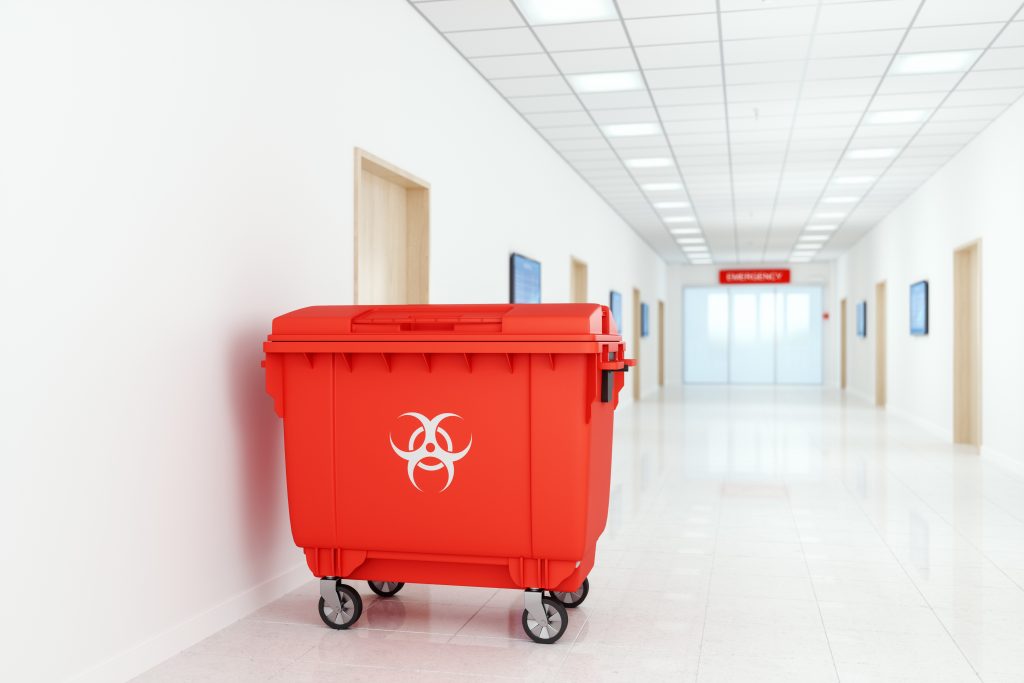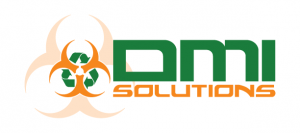Call us anytime
+1 800-455-7747
Email Us
Call us anytime
Email Us
Medical waste is defined by the US Environmental Protection Agency (EPA) as waste that can spread disease. This type of waste contains harmful microorganisms, and if not handled properly, it can negatively impact the environment and the people that come in contact with it.
Medical waste is specific to waste generated by healthcare facilities like hospitals, blood banks, physician offices, laboratories, research facilities, and so forth. These institutions deal with a high volume of waste, and if they aren’t careful, they can infect patients, workers, and the general public.
Medical waste can include, but isn’t limited to:

As a healthcare manager or worker, you must understand and abide by the regulations set for medical waste disposal.
Our professionals at DMI Solutions have been providing sanitary solutions to our medical partners throughout the Midwest for over 18 years. Below, we’ll explain the regulations governing medical waste and your options for packaging. Read on to learn more.
Medical waste regulations can vary by state. To be sure about your guidelines, you should contact your state’s Environmental Agency and Health Agency. In Missouri specifically, medical waste is regulated by the Missouri Department of Health and Senior Services and the Missouri Department of Natural Resources Waste Management Program.
These departments review the methods of waste removal for approval and regulate the packaging, tracking, transporting, and disposal of the waste.
Other national organizations like the Occupational Safety and Health Administration (OSHA) and the Centers for Disease Control and Prevention also have special guidelines and recommendations regarding handling medical waste.
OSHA’s mission is to ensure safe and sanitary conditions for workers. For health care workers in environments where there is exposure to bloodborne pathogens, employers must abide by OSHA’s Bloodborne Pathogens Standard.
To be compliant, employers must adhere to specific guidelines set by OSHA’s Bloodborne Pathogens Standard. This can include but is not limited to:
Creating an exposure control plan
Ensuring employees are appropriately trained on safety methods
Offering personal protective equipment (PPE)
Requiring mandatory Hepatitis B vaccinations
An exposure control plan classifies the tasks, procedures, and jobs where bloodborne pathogen exposure is likely. This is a living document which means it should be regularly updated (yearly) and revised to include the most recent information.
This document will serve as an information source for employees and, as such, should answer all questions related to bloodborne pathogen exposure. If you need help creating this document, OSHA provides a template.
Employees whose duties may require exposure to bloodborne pathogens should undergo yearly training to ensure they know about the risk and avoid exposure to disease.
This training must include critical elements of the exposure plan as well as information about the Hepatitis B vaccine and exposure procedures.
Employers must offer free Hepatitis B vaccinations to employees with occupational exposure to bloodborne pathogens or other potentially infectious materials (OPIM). Hepatitis B is an infection that can cause fatal liver complications and is more commonly spread through exposure to body fluids.
Employers are required to establish processes in the event of exposure. This process should include documenting the exposure, offering a medical evaluation, and testing the individual’s blood for bloodborne pathogens.
OSHA also sets regulatory requirements for disposing of medical waste materials. For containers holding sharp objects like needles, OSHA requires them to have a biohazard symbol displayed on the outside.
If the sharps are subject to leaking, OSHA requires that you place them in a separate container that is puncture-resistant and leakproof. By doing so, you ensure that the work environment is safe. If using reusable containers, you and your employees must avoid cleaning them manually, emptying them, or opening them in any way that could put you at risk of contamination.
Any containers holding medical waste products must be labeled according to regulations. This means that the universal symbol for biohazards and the word biohazard should appear on the containers in clear view.
These containers include but aren’t limited to:
Bags
Contaminated laundry
The labels must also be colored with a fluorescent orange background with letters or symbols of a contrasting color. Doing this makes the label more easily recognizable and legible so that workers have no trouble identifying it.
On the other hand, biohazard labels can be substituted for the use of red bags or containers.
The extensive regulations regarding medical waste storage, regulations, and disposal can be hard to grasp, leading to the search for reputable medical waste disposal companies. At DMI Solutions, we believe that your solution to medical waste services shouldn’t have to be.
We have years of experience in the medical disposal field, and we are well-versed in the regulations and requirements that govern them. We only use the most sanitary processes and procedures for transporting and disposing of medical waste.
We pride ourselves on offering exceptional services that allow us to keep you, your staff, and our community safe from infectious diseases. If you’re searching for the “best medical waste disposal near me,” our team at DMI Solutions is the best. Contact us today!

© Copyright 2020 by DMI Solutions INC